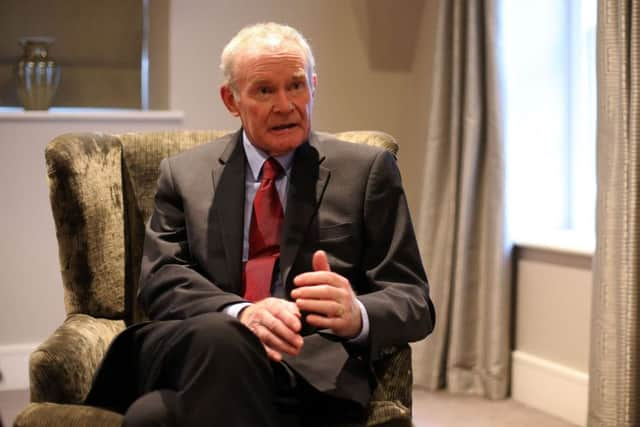It may take next generation to point a way for Ulster's future


Now, your view on whether or not Martin McGuinness was important is irrelevant.
The fact is, his death merited that astonishing amount of column inches in the UK’s leading newspaper.
Advertisement
Hide AdAdvertisement
Hide AdOnly the late Princess Diana, to my knowledge, merited the full page. McGuinness, a late admirer of royalty, would have been chuffed at that I’m sure.


His remarkable turnaround from a man of war to man of peace and Stormont’s Deputy First Minister is something entirely new in Ireland’s sorry history of conflict with the British.
The Easter Rising of a century ago did not create any real Nelson Mandela types.
So McGuinness had no real past hero to follow.
He ploughed his own negotiating furrow and remarkably successful he was too.


Advertisement
Hide AdAdvertisement
Hide AdPerhaps he had learned from past mistakes which had left Ireland’s 26 counties independent but impoverished for the next half century.
Had he not been stricken by the rare degenerative disease amyloidosis, who knows how our future would have unfolded.
I always got the impression he knew a long game had to be played because this generation was not ready for a United Ireland, particularly if the violence continued.
Politics is such a tough game in this country and while we have many good politicians within most of our local parties, I’m certain few of them are as clear about the future as Martin McGuinness appeared to be.
Advertisement
Hide AdAdvertisement
Hide AdOnce he decided that the IRA’s armed struggle against the Brits would never succeed, he quickly changed his outlook – former Cabinet Minister Norman Tebbit said he changed to avoid been sent to jail for his terrorist past – and persuaded the hard men there was a different way.
His early belief in his days as a practising terrorist that “God will understand the pressures we are under’’ soon disappeared under the flood of criticism from clergy of all denominations.
Yet his closest political pal was a man of God, the late Rev Ian Paisley, who had often roundly criticised all that Republicans stood for yet found the need too to do business with them in government. McGuinness absence, without doubt leaves us at a political crossroads – the elections just passed have caused shock waves throughout the country – and we are left with no obvious way forward that the two main parties can agree on. Are we to stutter on until a younger generation with little memory of the Troubles brings forward its own ideas?
This young, irreligious generation certainly won’t be praying each Sunday for God to understand “the pressures we are under’’.
Advertisement
Hide AdAdvertisement
Hide AdPartisan politics in fact may not suit their ideas. My generation is now sick to the teeth of the conflict.
The Troubles have dogged my own family since the 1920s when my Uncle James died aged 21 years as the result of a terrorist ambush. I was not born for another 21 years but his early death was part of our family history.
I could never have imagined that my own children would find leaving this country to carve a future elsewhere attractive. So, in fact, the Troubles have deprived me of regular contact with my grandchildren.
My grandmother Grace had to live with the loss of her son James but she taught her children forgiveness and that was passed down by her daughter, my mother, to me.
Advertisement
Hide AdAdvertisement
Hide AdIt’s a big ask of the many in this generation who have suffered in the Troubles for forgiveness for the likes of Martin McGuinness. Yet life moves on and we will never know what might have been had he not died so early.